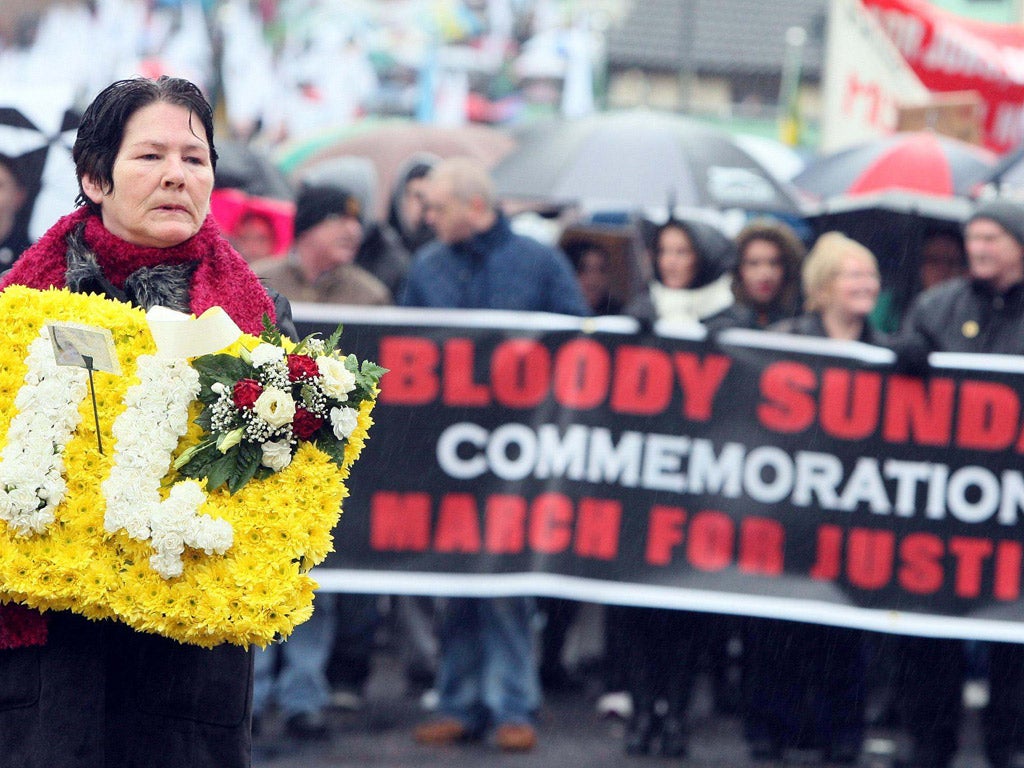'Bloody Sunday was poison. Finally our city is moving on'
On the 40th anniversary, the shootings still divide Londonderry. David McKittrick meets those looking forward – and back

Nationalists in Londonderry yesterday marked the 40th anniversary of Bloody Sunday – the event which shaped the history of their city when 14 youths and men on a civil rights march were killed by British soldiers.
Fewer people turned out than in previous years in a city whose atmosphere has improved greatly since David Cameron acknowledged in 2010 that those shot dead by paratroopers were innocent. The events of 29 January 1972 caused shock and revulsion across the world. In Northern Ireland, it marked the effective end of the non-violent campaign for civil rights. Many people who had previously regarded themselves as non-political joined the IRA.
Only a few of the bereaved joined yesterday's march, which attracted more than 1,000 people. Most families instead attended an outdoor service, where a minute's silence was observed and wreaths were laid.
"The lancing of the boil that occurred with Cameron was incredible," said Pat McArt, who edited the Derry Journal for almost a quarter of a century. "Bloody Sunday was a massive poison on the city. You could feel it ... Now there's a different atmosphere... The whole cultural and social thing is moving on."
Tommy McCourt, a community worker, added: "People were delighted and there was a lot of relief that those killed were exonerated. There is a lessening of the anger and urgency. But a lot of people still feel there is a distance to go."
The parents of the victims are, with the passing of four decades, all dead. But brothers, sisters and other relatives are still campaigning. For many, the key issue is whether the soldiers involved will be prosecuted. For 18 months, police and the authorities have been studying the legal and political issues involved.
"Families have different views," said Liam Wray, whose brother Jim, then 17, was killed. "What Cameron did was admirable but he said the shootings were unjustified and unjustifiable. That means those who were shot dead were murdered. I will campaign for prosecution as long as I have air in my lungs."
While decisions on possible prosecutions are awaited, Londonderry is planning for a future which will see it become the UK's city of culture in 2013. The city as a whole is determined the enterprise will be a success, hopefully delivering benefits to help counter its problems of unemployment and low wages. But no one predicts an early end to the sporadic violence of local dissidents, the splintered remnants of the now inactive major republican groups.
Ivan Cooper, a retired politician who was present on Bloody Sunday, said: "Public opinion is very strongly against them, but it's not difficult for a hundred people to keep the whole thing going."
Mr McArt added: "These dissidents got into a groove in 1972. They haven't got out of it – and they're never coming out of it until the day they die, but the rest of Derry has moved on, big time."
Join our commenting forum
Join thought-provoking conversations, follow other Independent readers and see their replies
Comments